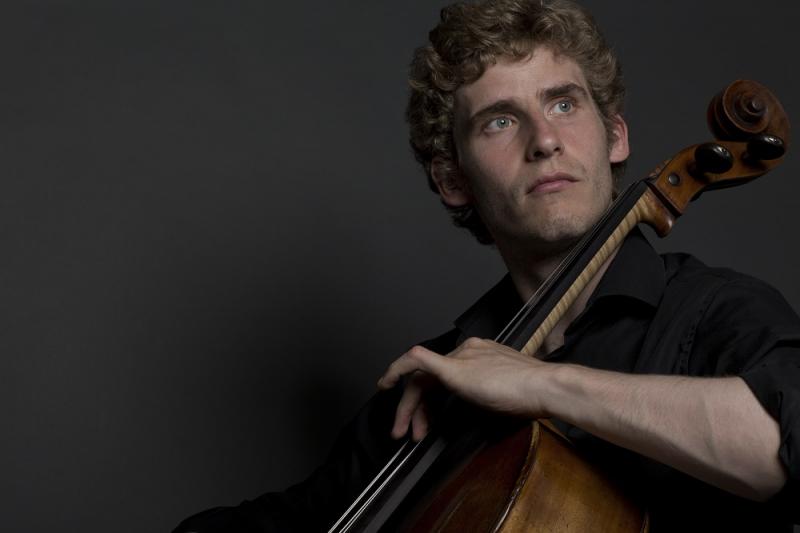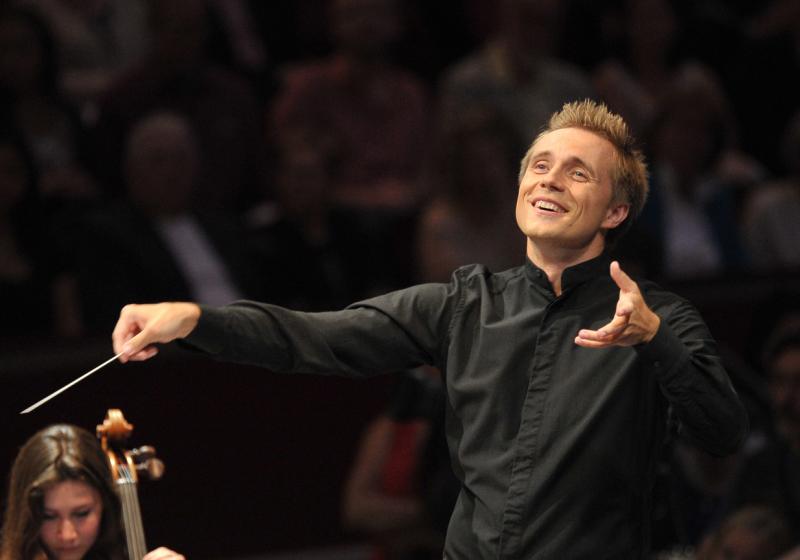Brantelid, LPO, Petrenko, RFH review - orchestral excesses redeemed by graceful Elgar | reviews, news & interviews
Brantelid, LPO, Petrenko, RFH review - orchestral excesses redeemed by graceful Elgar
Brantelid, LPO, Petrenko, RFH review - orchestral excesses redeemed by graceful Elgar
Young cellist offers valuable balance in a hard-driven programme

The London Philharmonic, conductor Vasily Petrenko and cellist Andreas Brantelid are just back from a tour of China, so they’ve had plenty of time to get to know each other. That affinity is apparent in the ease with which Petrenko (pictured below by Chris Christodoulou) marshals the orchestral forces, directly transmitting his trademark energy to every section.
The concert was part of a series entitled Changing Faces: Stravinsky’s Journey, a year-long series of Stravinsky-themed events the opening of which theartsdesk covered a fortnight ago, so the opening work was his Song of the Nightingale. This only modestly successful ballet was adapted from the early opera The Nightingale, and the lineage shows in the many woodwind and string solo passages: aria and recitative in new guises. In fact, the orchestration here is fabulously inventive. For example, we hear muted solo violin accompanied by two harps and celesta; bassoon duet accompanied by bass drum and timpani; or three trumpets all playing in unison, but with one of them muted. Naturally, this is an excellent showcase for the LPO’s principals, all of whom shone, with top honours going to flautist Juliette Bausor as the Nightingale itself. The downside is a distinct lack of musical structure or direction. There are very few tuttis, and without the opera’s narrative it is difficult to string the modest ensembles together. Petrenko didn’t really try, focusing instead on the quirky beauty of each section. From the opening bars of the Elgar, it was clear that Andras Brantelid was going to diverge from the norm. In a concerto usually performed in a sweeping, Romantic style, discreet gestures and classical grace might seem untoward. Those broken chords that open the work were here presented at moderate dynamic, and with little gesture or flamboyance. And this turned out to be the way with Brantelid’s entire interpretation. The approach worked best in the scherzo second movement, which danced gracefully under Brantelid’s light bow. The slow movement had a chamber-like elegance, its large scale maintained, even at this lower temperature, by impressively sustained lines from the soloist and the orchestral strings. The finale was a little lacking in drama and contrast, the quiet interlude before the return of the opening in particular losing its effect. But otherwise this was a fine reading, and Petrenko gauged its scale well, never drowning out the soloist, but giving the tuttis the required impact to structure the outer movements.
From the opening bars of the Elgar, it was clear that Andras Brantelid was going to diverge from the norm. In a concerto usually performed in a sweeping, Romantic style, discreet gestures and classical grace might seem untoward. Those broken chords that open the work were here presented at moderate dynamic, and with little gesture or flamboyance. And this turned out to be the way with Brantelid’s entire interpretation. The approach worked best in the scherzo second movement, which danced gracefully under Brantelid’s light bow. The slow movement had a chamber-like elegance, its large scale maintained, even at this lower temperature, by impressively sustained lines from the soloist and the orchestral strings. The finale was a little lacking in drama and contrast, the quiet interlude before the return of the opening in particular losing its effect. But otherwise this was a fine reading, and Petrenko gauged its scale well, never drowning out the soloist, but giving the tuttis the required impact to structure the outer movements.
Plenty of impact, too, in Scheherazade. Too much, in fact, in a reading of Rimsky-Korsakov that was all about drive and dynamism and too little about storytelling and magic. Petrenko attempted to open the first and last movements with a sudden stab, and caught the orchestra out both times. On the other hand, he built up to similarly imposing chords at the end of each inner movement, and the second was so perfectly choreographed that it prompted an impulsive ripple of applause. There was certainly plenty of energy here, and the orchestra was on top form throughout. The many solos in the second movement were all beautifully taken, and Petrenko, to his credit, gave each of them breathing space, the tempi fluid throughout the movement. But the third movement felt pedestrian, with strings not swooning as they might, and the finale was just too driven, too loud and too fast with little repose between the tuttis. The Elgar could have done with some of this energy and drama, while a little of the poise and the grace found there could have made the world of difference to the Rimsky-Korsakov.
rating
Share this article
The future of Arts Journalism
You can stop theartsdesk.com closing!
We urgently need financing to survive. Our fundraising drive has thus far raised £49,000 but we need to reach £100,000 or we will be forced to close. Please contribute here: https://gofund.me/c3f6033d
And if you can forward this information to anyone who might assist, we’d be grateful.

Subscribe to theartsdesk.com
Thank you for continuing to read our work on theartsdesk.com. For unlimited access to every article in its entirety, including our archive of more than 15,000 pieces, we're asking for £5 per month or £40 per year. We feel it's a very good deal, and hope you do too.
To take a subscription now simply click here.
And if you're looking for that extra gift for a friend or family member, why not treat them to a theartsdesk.com gift subscription?
more Classical music
 From Historical to Hip-Hop, Classically Black Music Festival, Kings Place review - a cluster of impressive stars for the future
From quasi-Mozartian elegance to the gritty humour of a kitchen inspection
From Historical to Hip-Hop, Classically Black Music Festival, Kings Place review - a cluster of impressive stars for the future
From quasi-Mozartian elegance to the gritty humour of a kitchen inspection
 Shibe, LSO, Adès, Barbican review - gaudy and glorious new music alongside serene Sibelius
Adès’s passion makes persuasive case for the music he loves, both new and old
Shibe, LSO, Adès, Barbican review - gaudy and glorious new music alongside serene Sibelius
Adès’s passion makes persuasive case for the music he loves, both new and old
 Anja Mittermüller, Richard Fu, Wigmore Hall review - a glorious hall debut
The Austrian mezzo shines - at the age of 22
Anja Mittermüller, Richard Fu, Wigmore Hall review - a glorious hall debut
The Austrian mezzo shines - at the age of 22
 First Person: clarinettist Oliver Pashley on the new horizons of The Hermes Experiment's latest album
Compositions by members of this unusual quartet feature for the first time
First Person: clarinettist Oliver Pashley on the new horizons of The Hermes Experiment's latest album
Compositions by members of this unusual quartet feature for the first time
 Gesualdo Passione, Les Arts Florissants, Amala Dior Company, Barbican review - inspired collaboration excavates the music's humanity
At times it was like watching an anarchic religious procession
Gesualdo Passione, Les Arts Florissants, Amala Dior Company, Barbican review - inspired collaboration excavates the music's humanity
At times it was like watching an anarchic religious procession
 Classical CDs: Camels, concrete and cabaret
An influential American composer's 90th birthday box, plus British piano concertos and a father-and-son duo
Classical CDs: Camels, concrete and cabaret
An influential American composer's 90th birthday box, plus British piano concertos and a father-and-son duo
 Cockerham, Manchester Camerata, Sheen, Martin Harris Centre, Manchester review - re-enacting the dawn of modernism
Two UK premieres added to three miniatures from a seminal event of January 1914
Cockerham, Manchester Camerata, Sheen, Martin Harris Centre, Manchester review - re-enacting the dawn of modernism
Two UK premieres added to three miniatures from a seminal event of January 1914
 Kempf, Brno Philharmonic, Davies, Bridgewater Hall, Manchester review - European tradition meets American jazz
Bouncing Czechs enjoy their Gershwin and Brubeck alongside Janáček and Dvořák
Kempf, Brno Philharmonic, Davies, Bridgewater Hall, Manchester review - European tradition meets American jazz
Bouncing Czechs enjoy their Gershwin and Brubeck alongside Janáček and Dvořák
 Solomon, OAE, Butt, QEH review - daft Biblical whitewashing with great choruses
Even a top soprano and mezzo can’t make this Handel paean wholly convincing
Solomon, OAE, Butt, QEH review - daft Biblical whitewashing with great choruses
Even a top soprano and mezzo can’t make this Handel paean wholly convincing
 Two-Piano Gala, Kings Place review - shining constellations
London Piano Festival curators and illustrious friends entertain and enlighten
Two-Piano Gala, Kings Place review - shining constellations
London Piano Festival curators and illustrious friends entertain and enlighten
 Echo Vocal Ensemble, Latto, Union Chapel review - eclectic choral programme garlanded with dance
Beautiful singing at the heart of an imaginative and stylistically varied concert
Echo Vocal Ensemble, Latto, Union Chapel review - eclectic choral programme garlanded with dance
Beautiful singing at the heart of an imaginative and stylistically varied concert
 Scott, Irish Baroque Orchestra, Whelan, RIAM, Dublin review - towards a Mozart masterpiece
Characteristic joy and enlightenment from this team, but a valveless horn brings problems
Scott, Irish Baroque Orchestra, Whelan, RIAM, Dublin review - towards a Mozart masterpiece
Characteristic joy and enlightenment from this team, but a valveless horn brings problems

Add comment